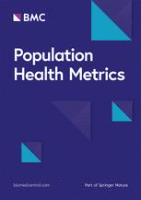
Population Health Metrics
Scope & Guideline
Connecting Research to Real-World Health Outcomes
Introduction
Aims and Scopes
- Population Health Measurement:
The journal emphasizes the development and application of metrics to assess population health, including life expectancy, disability-adjusted life years (DALY), and other health indicators. - Mortality and Morbidity Analysis:
Research often focuses on understanding causes of mortality and morbidity, examining trends across different demographics and geographic regions. - Health Disparities and Inequities:
A consistent focus on identifying and analyzing health disparities related to socioeconomic, geographical, and ethnic factors, aiming to inform policy and interventions. - Innovative Statistical Methods:
The journal publishes studies that utilize advanced statistical techniques, including Bayesian modeling, small area estimation, and machine learning, to analyze population health data. - Data Quality and Health Information Systems:
Research includes evaluations of health information systems and the quality of health data, aiming to improve data collection methods and reporting practices. - Global Health Perspectives:
The journal covers a broad range of geographic contexts, emphasizing studies from low- and middle-income countries to address global health challenges.
Trending and Emerging
- Impact of COVID-19 on Population Health:
There is a significant increase in studies examining the effects of the COVID-19 pandemic on various health metrics, including mortality rates, health disparities, and healthcare systems. - Health Data Analytics and Machine Learning:
Emerging research is leveraging machine learning and advanced analytics to improve the accuracy of health predictions and assessments, indicating a trend towards integrating technology with public health research. - Mental Health Metrics:
Research on mental health is gaining prominence, with studies focusing on population mental wellbeing and the impact of socioeconomic factors on mental health outcomes. - Longitudinal and Cross-Country Comparisons:
There is a growing trend towards longitudinal studies and cross-country comparisons that assess health metrics over time and across different healthcare systems. - Health Equity and Social Determinants:
An increasing emphasis on the social determinants of health and health equity reflects a commitment to understanding and addressing health disparities in diverse populations.
Declining or Waning
- Traditional Epidemiological Studies:
There seems to be a decline in traditional epidemiological studies that rely solely on basic statistical analysis without incorporating new methodologies or metrics. - Single-Disease Focus:
Research that concentrates on single diseases is becoming less prominent. There is a noticeable shift towards studies that consider comorbidities and broader health outcomes. - Static Health Metrics:
The use of static health metrics without consideration of dynamic changes over time or across populations appears to be decreasing, as the journal increasingly favors innovative and adaptable measurement approaches. - Localized Health Issues without Broader Context:
Studies focusing exclusively on localized health issues without linking them to broader population health trends or frameworks are becoming less common.
Similar Journals
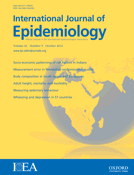
INTERNATIONAL JOURNAL OF EPIDEMIOLOGY
Shaping the discourse in epidemiology and medicine.INTERNATIONAL JOURNAL OF EPIDEMIOLOGY, published by Oxford University Press, is a leading peer-reviewed journal established in 1972, dedicated to advancing the field of epidemiology and its applications in medicine. With an impressive impact factor and a Q1 ranking in both Epidemiology and Miscellaneous Medicine, this journal ranks among the top-tier publications in its category, reflecting its commitment to high-quality research and scholarship. The journal serves as a vital platform for researchers, professionals, and students to share innovative findings, methodologies, and insights in epidemiological science, thus contributing to the broader understanding of public health. The journal includes a diverse range of articles encompassing the latest trends and developments in the field, ensuring comprehensive access to essential information and promoting evidence-based practices. For those seeking rigorous academic discourse and the latest research, the INTERNATIONAL JOURNAL OF EPIDEMIOLOGY is an indispensable resource in the realm of health studies.

JOURNAL OF EPIDEMIOLOGY AND COMMUNITY HEALTH
Empowering communities with vital epidemiological insights.JOURNAL OF EPIDEMIOLOGY AND COMMUNITY HEALTH, published by the esteemed BMJ PUBLISHING GROUP, stands as a leading journal in the fields of Epidemiology and Public Health. With an impressive impact factor and ranking in the Q1 quartile for both Epidemiology and Public Health categories as of 2023, it significantly contributes to the dissemination of critical research that shapes public health policies and practices globally. The journal has been a vital resource since 1978, continuously providing an academic platform for the latest advancements and discussions pertinent to community health, environmental concerns, and epidemiological studies. Researchers, professionals, and students alike depend on this influential publication for rigorous peer-reviewed articles, thereby enhancing its reputation as one of the top journals in the field. Despite the absence of Open Access options, the journal's scholarly contributions are evident, making it indispensable for anyone engaged in public health and epidemiological research.
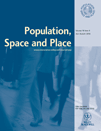
Population Space and Place
Illuminating Spatial Dimensions of Demographic ChangePopulation Space and Place is an esteemed academic journal published by WILEY, dedicated to advancing the fields of demography and geography, planning, and development. With an impressive 2023 impact factor and categorized in the top quartile (Q1) for both demography and geography, this journal serves as a vital platform for researchers, professionals, and students seeking to explore the spatial dimensions of population dynamics. Founded in 2004 and running through 2024, it has established itself as a significant contributor to scholarly discussions, evidenced by its high Scopus rankings, including rank #18 out of 139 in demography and #165 out of 821 in geography and planning. While the journal currently does not offer open access, it remains a key resource for those involved in academic research and policy formulation. With its focus on the interplay between population trends and spatial analytics, Population Space and Place is essential for anyone aiming to understand the complexities of population geography in a rapidly changing world.
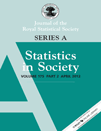
JOURNAL OF THE ROYAL STATISTICAL SOCIETY SERIES A-STATISTICS IN SOCIETY
Elevating Understanding of Statistics in Everyday LifeJournal of the Royal Statistical Society Series A - Statistics in Society is a premier academic journal published by Oxford University Press, dedicated to advancing the understanding and application of statistical methods in the context of social issues. With an ISSN of 0964-1998 and an E-ISSN of 1467-985X, this journal has consistently been recognized for its high-quality contributions, reflected in its prestigious impact factors and quartile rankings. As of 2023, it holds a Q1 status in Social Sciences (miscellaneous) and notable Q2 rankings in Economics and Econometrics, as well as in Statistics and Probability, illustrating its influence and authority in the relevant fields. Researchers and professionals engaging with this journal can expect rigorous peer-reviewed articles, innovative methodologies, and comprehensive discussions that address contemporary statistical challenges within society. While currently not offering Open Access, the journal is committed to disseminating knowledge that enhances understanding of the interplay between statistics and social dynamics. Spanning from 1988 to 2024, the Journal of the Royal Statistical Society Series A remains a crucial resource for scholars looking to explore the vital intersection of statistical theory and societal applications.

MMWR Surveillance Summaries
Unveiling Critical Insights in Health Information ManagementMMWR Surveillance Summaries, published by the Centers for Disease Control and Prevention, is a premier journal within the fields of Epidemiology, Health Information Management, and related health sciences. With an impressive recognition as a Q1 journal in multiple categories, it ranks among the top resources for scholars and practitioners, boasting significant impact factors reflecting its authority and relevance. This journal serves as a vital conduit for disseminating critical public health surveillance data, shaping health policies and practice. Its comprehensive coverage from 2002 to 2024 ensures that researchers and professionals remain informed of vital trends and findings in the ever-evolving landscape of public health. Although not an open-access journal, MMWR Surveillance Summaries remains an essential repository of information, guiding critical research and decision-making in health-related fields.

Health Services and Outcomes Research Methodology
Exploring rigorous approaches to improve public health.Health Services and Outcomes Research Methodology is a premier journal published by Springer, dedicated to advancing the field of health services research through rigorous methodology. Established in the Netherlands, this journal operates without an Open Access model, ensuring a quality-controlled environment for distributing important findings in the health policy and public health domains. With a commendable impact factor that places it in the second quartile (Q2) for both Health Policy and Public Health, Environmental and Occupational Health categories, it ranks favorably in Scopus, showcasing its relevance and influence within these critical fields. Researchers, healthcare professionals, and graduate students will find this journal a vital resource for exploring innovative research methodologies and outcomes that critically inform health systems and policies. The journal spans contributions from the convergence years of 2000 to 2004, and continues to publish impactful studies every year to 2024, elevating the discourse surrounding health services research.

Statistics in Biosciences
Transforming Biosciences with Cutting-Edge StatisticsStatistics in Biosciences is a distinguished journal published by Springer, focusing on the innovative interplay between statistical methodologies and biosciences. Established in 2009, this journal aims to provide a platform for the dissemination of cutting-edge research in statistical applications within biochemistry, genetics, and molecular biology. With an impressive impact factor and a distinguished ranking in multiple categories, including Q2 in Biochemistry, Genetics and Molecular Biology (miscellaneous) and Q3 in Statistics and Probability, it serves as a crucial resource for researchers, professionals, and students seeking to deepen their understanding of statistical applications in biological contexts. The journal is accessible through traditional subscription models, ensuring that high-quality research remains available to a wide audience. Featuring contributions that advance statistical theory and application in the biosciences, Statistics in Biosciences is committed to fostering collaboration and innovation in a rapidly evolving scientific landscape.
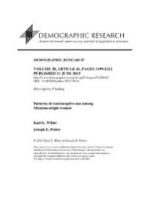
Demographic Research
Innovating research for a deeper demographic understanding.Demographic Research is a leading journal in the field of demography, published by the prestigious Max Planck Institute for Demographic Research. Available in both print and electronic formats (ISSN: 1435-9871, E-ISSN: 1435-9871), this open-access journal has been a valuable resource for demographers and social scientists since its inception in 1999. With a commendable impact factor and ranked Q1 in its category, the journal demonstrates a significant commitment to advancing our understanding of demographic trends and their implications across contexts. Hailing from Germany, the journal's rich international perspective adds depth to its studies, making it a vital platform for innovative research. Researchers, professionals, and students are encouraged to engage with its wealth of articles that not only document demographic changes but also offer insights critical for policy-making and social planning. The journal's broad scope encompasses diverse themes, providing a comprehensive overview of the demographic shifts that shape societies today.

International Journal of Population Data Science (IJPDS)
Connecting global scholars in the pursuit of data-driven solutions.Welcome to the International Journal of Population Data Science (IJPDS), an esteemed publication dedicated to advancing the field of population data science through innovative research and comprehensive studies. Published by Swansea University in the United Kingdom, this open access journal has been providing a platform for scholarly exchange since 2017, making it freely accessible to a global audience. With an impressive Q1 ranking in Demography and notable placements in Health Informatics and Information Systems, IJPDS attracts high-quality contributions that enhance our understanding of population dynamics and inform health data management. Here, researchers, professionals, and students can explore cutting-edge findings that bridge data science and health applications, underscoring the significance of data-driven insights for societal advancement. The journal’s broad scope ensures it remains at the forefront of demographic and informatics research, essential for tackling contemporary challenges in health and population studies.
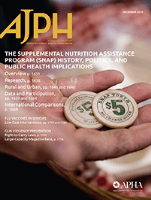
AMERICAN JOURNAL OF PUBLIC HEALTH
Innovating solutions for community health challenges.The American Journal of Public Health, published by the American Public Health Association, stands as a cornerstone in the field of public health and epidemiology since its inception in 1949. With its rigorous peer-review process and a robust commitment to advancing knowledge and research practices, this journal holds a prestigious position in the academic community, as reflected in its 2023 Scopus ranking, where it is placed in the top percentile (93rd) within the categories of Public Health and Environmental and Occupational Health. The journal's focus encompasses a broad spectrum of public health topics, making it essential reading for researchers, practitioners, and students dedicated to improving population health. Subscribers can access invaluable insights through its collection of innovative studies and reviews, thereby reinforcing the journal's role in shaping public health policy and practice. By bridging research and real-world application, the American Journal of Public Health remains a vital resource for those engaged in the quest to improve health outcomes across diverse communities.